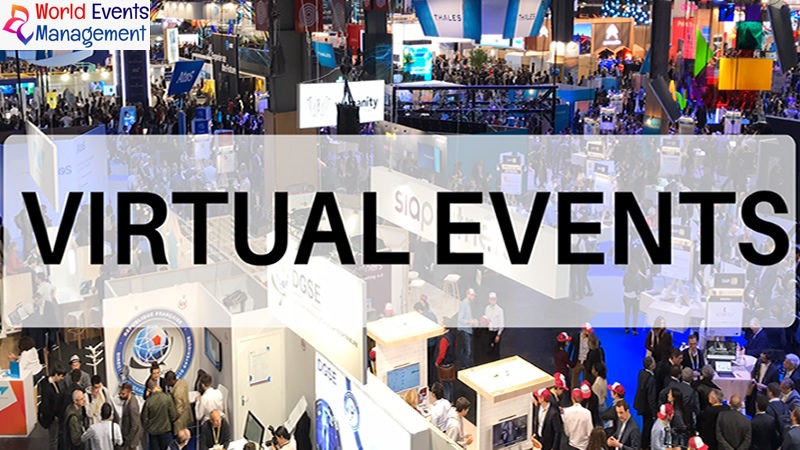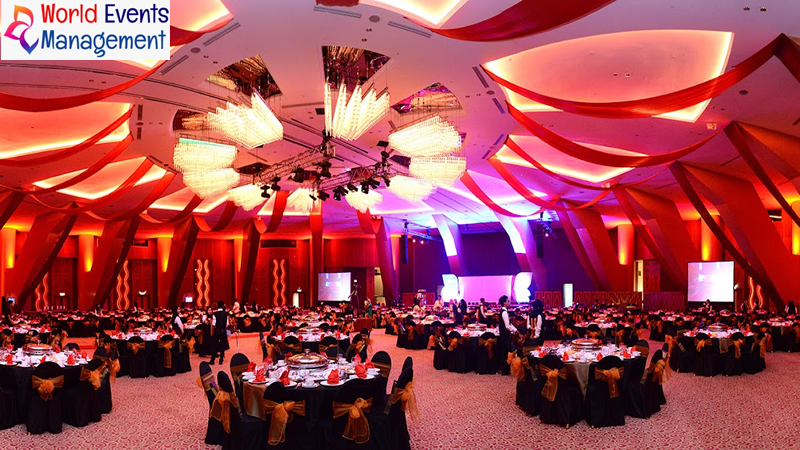VIRTUAL EVENTS: What Are They? Types of Virtual Events
How might you transform training meetings and gatherings into virtual occasions?
The in-person connection is the favored method to lead business for the dominant part of individuals. Be that as it may, cooperating has demonstrated itself to be a fundamental aspect of an occasion program. Continue perusing to figure out how to turn multi-day meetings brimming with instructive meetings and systems administration into virtual ones.
Our event management companies can teach you how to virtualize attendees’ insights and how to keep them engaged from the beginning until the end of an event. Both virtual events and in-person meetings warrant the same attention and care, both necessitate effective promotion, guest’s engagement, and the creation of memorable moments.
The only difference between them is that virtual events lack on-site guests and a lack a venue. However, by creating engaging virtual events and valuable experiences you can produce efficient events that go beyond a screen.

Furthermore, here comes our part as the event management companies in Dubai to direct you through the cycle. Virtual occasions happen on the web, they can be facilitated from your home or office. They can be shows, worldwide meetings, expos, item dispatches. All you need is a versatile or PC and web association.
Plus, you need to remember that virtual events could cover various topics and they do not replace all kinds of events, rather they could be used hand in hand with existing events. And keep in mind that your company’s desired results are optimized by the way you choose speakers, how you time your event, and how you choose your audience.
Let us talk about the types of virtual events.
First: the webinars:
Online classes keep going for 45 and 80 minutes, where participants tune in to or watch a speaker. Normally crowds are charged a confirmation expense, however many are accessible for nothing. Webinars use videoconferencing software, that allows the speaker to hold Q&A sessions, make a live presentation, or tapped one, besides the content is available to be viewed after the event. Webinars hold both internal and external sessions, and since they are educational, they aim at a 100% virtual attendance.
Second: virtual conferences:
Virtual gatherings just as in-person ones include mind-boggling, live plans. They consist of breakouts, sessions, keynotes, and many more. Also, some of them require various meetings and use devices for network commitment. As opposed to in-person events virtual ones allow attendees access to real-time keynotes.
In Virtual conferences there is interaction with others, viewing content on-demand, and building agendas of their own.

Third: hybrid events (internal):
For example, office gatherings, instructional meetings, deals launces, and friends happenings. Which permits organizations that direct worldwide organizations, to impart messages to their entire staff which is scattered through different settings. Setting aside your time and cash.
As it would be a bad dream to plan clashes and control the expense of flying workers to your organization.
Fourth: hybrid events (external)
These types of hybrid events allow people outside your company, unable to attend an event, to learn, and participate in a conference, industry meeting, or user concert without leaving their homes. Outside occasions request great video creation such that every one of your visitors experiences things a similar way.
The motivation behind occasions both virtual and in-person is to uncover your organization’s message of building lifetime esteems, building steadfastness, boosting income. We provide event management services in Dubai, UAE. we know that holding an event personally, virtually, or a combination of both has its share of pros and cons.
Subsequently, here is a rundown of reasons that make facilitating a virtual occasion advantageous:
First, demonstrating an in-person occasion permits visitors outside your territory to take an interest.
Second, it helps you trim expenses, making your event smaller and allowing guests unable to physically travel, to attend.
Third, it allows the show to go on! if there should arise an occurrence of a horrible climate, travel boycotts, or some other misfortunate occasion.
How to decide on a space to host your event.
First, think about the space:
You have to mull over the size of the space for on-camera action, team, and gear.
Second, consider lighting:
What sort of lighting you need, how common lighting influences space?
Third, do not forget the Noise:
Is there a commotion that could meddle while streaming, do you need any hardware to damper it?
Fourth, provide internet bandwidth:
you will require a min of 10Mbs of both transfer/download speed to do 1 HD video transfer. Not to overlook the team will require the organization too.
Fifth, the number of speakers:
You have to realize it to give adequate gear, for example, mouthpieces and cameras.
Sixth, the overall look:
Do you have to manufacture a set, or space that is normally secured with decent visual scenery?
Let us talk now about the essentials of virtual and in-person occasions. Remember that both faces to face and virtual occasions cooperate as a component of your organization’s showcasing technique. Thusly, virtual occasions ought not to be excused they should be a key component of your occasion.
To start with, virtual occasions require exhaustive advertising and focused on advancement.
Second, engaging sessions and keynotes that guests can relate to are essential.
Third, catching visitors and commitment information in addition to deciding the expense are basic components to measure your occasion achievement.
In-person and virtual events are two different things.

Virtual occasions have restrictions, they rely upon content and require inventiveness and innovation. Furthermore, when intending to hold a virtual gathering one must zero in on making one-on-one cooperations. Though in-person occasions draw participants by offering recognizable objections and a stage to organize in.
A virtual event does not provide interpersonal interactions, the way in-person event does. Thus, the success of a virtual event relies on meticulous planning, agility, and follow-up meetings, as well as on connectivity and the quality of video productions. Not to forget, event website, event registration, live presentation content, live polling, note-taking, question/answer, recorded content, interactive conferencing, feedback surveys.
So, the technology required for virtual events include:
1-Event website:
A website is needed to promote your event, whether virtual or in-person. The website should present the value your event has, display its schedule, reveal speakers, including frequently asked questions, and guide attendees through the registration process.
2-Registration:
Allowing attendees to register easily while giving marketers and planners data they can use to plan a successful event.
3-Email marketing:
Where you inform attendees about an event before it happens. Emails can be used to interact with attendees on the way to the event. Plus, you can use emails for feedback surveys.
4-Online event guide & mobile event app:
Mobile apps for events are essential for virtual events, just like they are for in-person ones. Tools like this can work on all sorts of website browsers and mobile devices. Such tools connect attendees, permitting attendees to build connections virtually. And it allows planners to gather data they need for future events.
Although virtual events might feel different, they should be treated as an actual in-person event. Give attendees a chance to send messages or practice accessing a session before the start of an event. This will minimize the number of questions asked on the first day. Besides, you must engage attendees and make them feel like part of an actual community. Make sure attendees are connected on the event app, where they can book in-person appointments with one another, with the sponsors, or with exhibitors.
To conclude, event management companies will guide you to add virtual events to your plan. Do not hesitate to contact us. In the end, even though virtual events are not as effective as in-person ones, certain circumstances demand the transition to virtual. So, the right technology and planning will allow you this transition.


